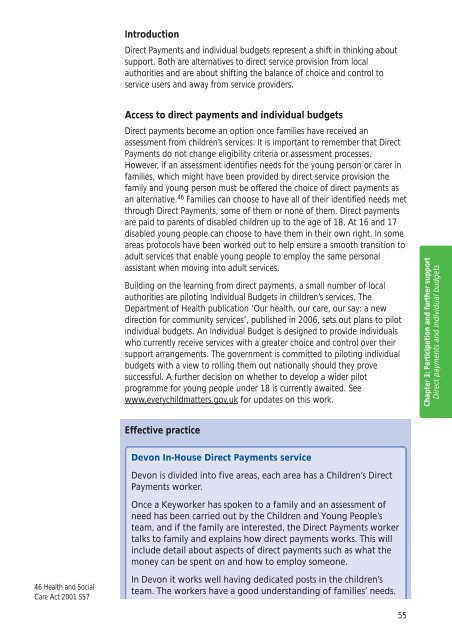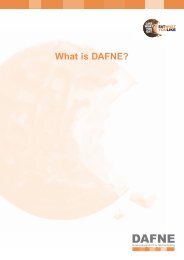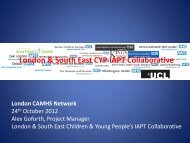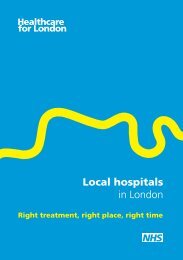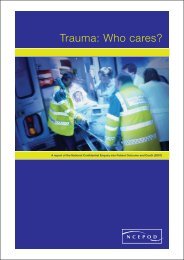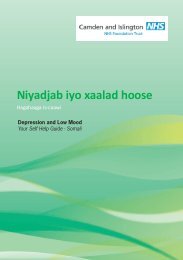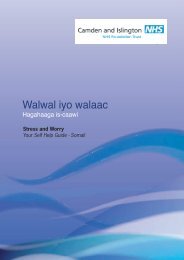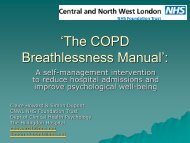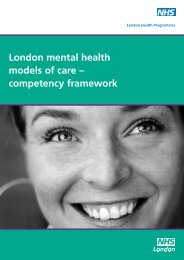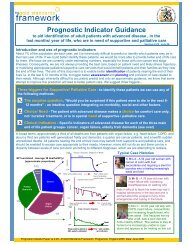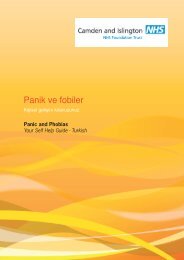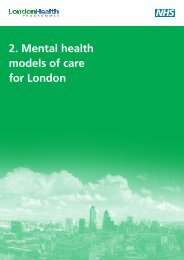A Transition Guide for All Services - Transition Information Network
A Transition Guide for All Services - Transition Information Network
A Transition Guide for All Services - Transition Information Network
- No tags were found...
Create successful ePaper yourself
Turn your PDF publications into a flip-book with our unique Google optimized e-Paper software.
IntroductionDirect Payments and individual budgets represent a shift in thinking aboutsupport. Both are alternatives to direct service provision from localauthorities and are about shifting the balance of choice and control toservice users and away from service providers.Access to direct payments and individual budgetsDirect payments become an option once families have received anassessment from children’s services. It is important to remember that DirectPayments do not change eligibility criteria or assessment processes.However, if an assessment identifies needs <strong>for</strong> the young person or carer infamilies, which might have been provided by direct service provision thefamily and young person must be offered the choice of direct payments asan alternative. 46 Families can choose to have all of their identified needs metthrough Direct Payments, some of them or none of them. Direct paymentsare paid to parents of disabled children up to the age of 18. At 16 and 17disabled young people can choose to have them in their own right. In someareas protocols have been worked out to help ensure a smooth transition toadult services that enable young people to employ the same personalassistant when moving into adult services.Building on the learning from direct payments, a small number of localauthorities are piloting Individual Budgets in children’s services. TheDepartment of Health publication ‘Our health, our care, our say: a newdirection <strong>for</strong> community services’, published in 2006, sets out plans to pilotindividual budgets. An Individual Budget is designed to provide individualswho currently receive services with a greater choice and control over theirsupport arrangements. The government is committed to piloting individualbudgets with a view to rolling them out nationally should they provesuccessful. A further decision on whether to develop a wider pilotprogramme <strong>for</strong> young people under 18 is currently awaited. Seewww.everychildmatters.gov.uk <strong>for</strong> updates on this work.Chapter 3: Participation and further supportDirect payments and individual budgetsEffective practiceDevon In-House Direct Payments serviceDevon is divided into five areas, each area has a Children’s DirectPayments worker.Once a Keyworker has spoken to a family and an assessment ofneed has been carried out by the Children and Young People’steam, and if the family are interested, the Direct Payments workertalks to family and explains how direct payments works. This willinclude detail about aspects of direct payments such as what themoney can be spent on and how to employ someone.46 Health and SocialCare Act 2001 S57In Devon it works well having dedicated posts in the children’steam. The workers have a good understanding of families’ needs.55


